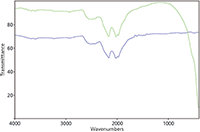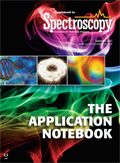Diamond Anti-Reflection Coating
Application Notebook
Diamond is an important material choice for sampling optical elements in Fourier transform-infrared (FT-IR) spectroscopy. The multi-phonon absorption in the mid-infrared, although temperature dependent, is weak for thin optical elements and can be referenced to an empty cell background. However, the cost of diamond optics requires the sampling area to be very small. As a result, the signal-to-noise ratio (SNR) advantages of the FT-IR systems are frequently stretched to the limit and more energy throughput is usually quite helpful.
Frequently, the sampling technique of choice is attenuated total reflection (ATR) for its benefits of ease of analysis. ATR elements can be manufactured from most optical materials of relatively high refractive index. Ge, Si, ZnSe, ZnS, KRS-5, and diamond are often used for this application. For most of these materials, a broad band anti-reflection (BBAR) coating can be applied to both surfaces of a window or the entrance and exit facets of an ATR element and can significantly increase the energy throughput of the sampling accessory or system.
Since diamond and ZnSe have similar refractive indexes a similar BBAR can be used on diamond once the binding layers of the coating are appropriately modified.
Spectral Systems has developed its Diamond XP-BBAR(tm) coating with spectral performance as shown in Figure 1.

It is seen in Figure 1 that the energy and thus the SNR is about 30% better through most of the analysis region of a typical FT-IR instrument.
Since there are no suitable coating materials for the very long wavelength portion of the spectrum the coated element is not as good, but still usable, below 600 cm-1. If a liquid nitrogen cooled MCT detector is used, this portion of the spectrum is usually not recorded by the spectrometer.

Spectral Systems
35 Corporate Park Drive, Hopewell Junction, NY 12533
tel. (845) 896-2200
Website: www.spectral-systems.com
